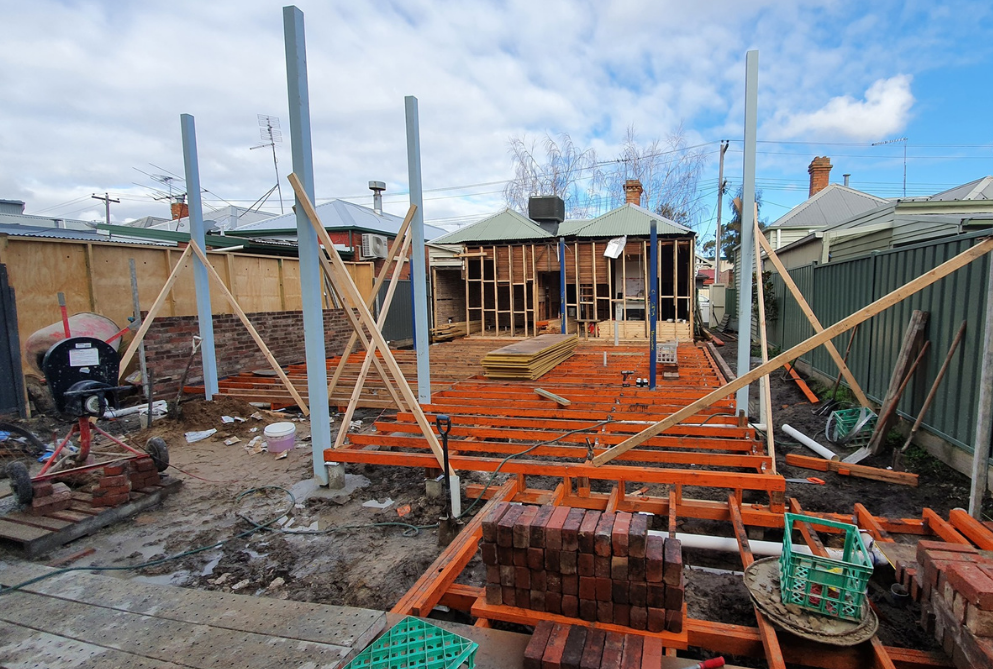Can I Keep Living in My Home During the Renovation Build?
There is no getting around the fact that a home renovation is a significant financial investment. It makes sense to look at all the ways to optimise your budget and funnel it toward the house of your dreams. Staying at home during your renovation works and saving yourself the cost of accommodation is one way to do this. Sticking around also means that there is someone available to communicate with your builder in regard to progress or changes to your plan; however, a professional builder should have open lines of communication regardless of where you’re living.
There’s a lot to weight up when deciding whether to hit your family or friends up for their spare room, set up in a caravan park, rent a house, or hunker down at home. Having one bathroom renovated while your family uses a second one is no huge inconvenience but a second-storey extension, for example, is an entirely different matter.
Is staying in your home an option?
Before you decide to stick it out at home and live on your building site, determine whether the option is even on the table. You could get by without a kitchen for a while by setting up a makeshift area to prepare food in another area of your home but life is going to be very difficult if you don’t have access to a bathroom. You may not have constant access to utilities which makes life tricky, especially during extremes of weather. Have a conversation with your builder about whether it’s feasible for you to stay home during construction and how you’d go about it.
Just because your builder says it’s possible for you to stay onsite doesn’t mean it’s going to be a walk in the park. It won’t be life as usual with a bit of extra noise, it’s a serious upheaval. Preparation is everything, so here are some things to consider that will allow you to make an informed decision about whether to stay home or leave your builders to it.

Renovations are dusty.
The dust gets everywhere. Constantly. If you pack up and leave during the project you’ll be able to shut off some rooms and cover furniture and valuable items—that means a single clean before you move back in. Staying home means that you’re inundated by the dust and believe me, that stuff seems to hang in the air ready to settle on surfaces you’ve just finished wiping down. You’re going to have to let your house keeping standards slide, and if you’re a neat freak this is going to be tough.
No slow starts to the morning.
Builders and tradies start early. I’m talking just staggering to the kitchen with bleary eyes in search of coffee early. There’ll be no sleeping in or wandering around in your PJs because there’ll be a bunch of guys making a stack of noise at the crack of dawn. If you’re up and at ‘em early anyway, this won’t be the straw that breaks your back, but night owls, be warned.

Life might not be comfortable
Your home might be draughty or completely open to the elements. During an extension in particular, your home will likely be missing walls, doors, windows, or even a roof. This exposes you to the elements day and night. It depends on the scope of your project and whether you can seal yourselves into a separate section of the house but be prepared for the weather to impact your lives more than usual.
Missing walls aside, you might be not be able to climate control your home while certain utilities are unavailable. Your usual mode of heating, or your air-conditioning, might be offline for a period of time so life might feel a lot like camping (although, hopefully on the glamping side of the scale).
Do you have kids or pets?
Kids and pets add a whole extra dimension to your plan to stay at home. A building site is inherently dangerous for curious little people and furry friends. Builders and trades have numerous safety procedures in place but these are adult professionals who operate under dangerous conditions day-in and day-out. Your builder can make some allowances in the schedule or planning of works to accommodate your family but keeping your kids safe is your responsibility. Small children will likely require baby gates to keep them well away from the construction zone and out from under your builders’ feet. If you’re home during the day with little ones, naps and feeds and all the things that consume your time during the day will be impacted by noise and dust.

Will it take over your life?
Letting your renovation builder get on with the job while you get on with yours can be great for your mental health. Renovation specialists live and breathe renos—they know how to work through delays with supplies or roll with the punches when plans need to be amended. Living in the construction site might make your renovation seem all consuming. It can be difficult to detach yourself from the minutia of the project and not sweat the little things. You builders have got it under control—this is what they do. Make sure you’re able to let them get on with it because it’s in everyone’s best interest.
Your home is your builders’ workplace.
Living in a house that is filled with tradies is like having house guests on steroids. It’s important to recognise that your house is your builders’ workplace for the next weeks or months and they need to feel comfortable there just as much as you do. Make sure that the quality of your relationship with the trades onsite means they feel free to use your home’s facilities. I don’t just mean the toilet—they’ll need access to the air-conditioning, or the kitchen and outdoor furniture for their breaks without having to check in with you first.
If trades can come and go freely through their own entrance without bothering you at all life is going to be that much easier. Give them a space to stash their equipment where it won’t get in your way and where you won’t be constantly wandering in and out. Your builders shouldn’t need to tiptoe around you, nor you around them.
Are you up for staying home during construction? A lot rides on the scope of your renovation and your tolerance for inconvenience. Talking openly to your renovation builder is your best bet. It may be that you can stay put for a portion of the renovation but will be best served if you move out for the most impactful works. Be honest with yourself about what you can tolerate.

